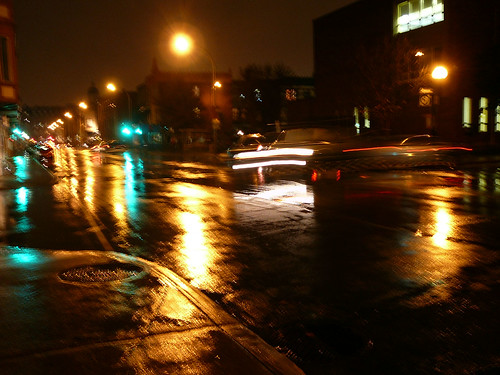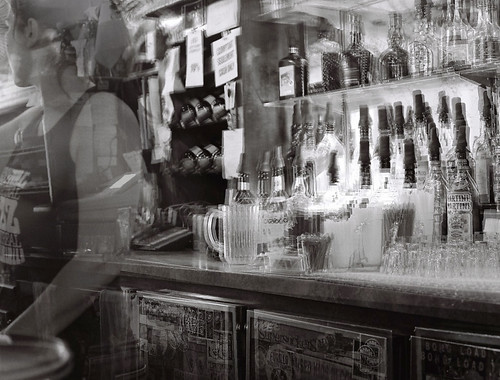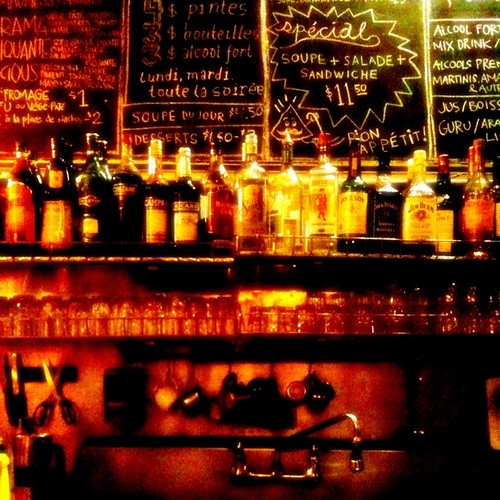Ghost Town
by Kris Romaniuk • October 29, 2012 • Short Fiction • 0 Comments
Not all ghost towns are haunted. Not all ghost towns are empty.
I live in a ghost town. Population approximately 100,390 men, women and children. I have a feeling there is a lower than average proportion of children. My ghost town is a trendy neighborhood on an Island that’s a major metropolitan city.
Despite the population density, my ghost town is one of the most haunted in the country. That’s the funny thing about densely populated ghost towns: most of the souls still haunting its rooms and streets and apartments are wandering them in the flesh. Perhaps this makes them sound more like zombies than ghosts, but their souls are tortured and intact, and haunt their bodies with so many regrets and fears and desires.
Many people move to my ghost town to be part of something bigger – part of a scene, part of a community, part of the next big thing. They soon find, however, that it’s mostly an illusion and end up wandering its streets, rooms and apartments lonely and lost, and unable to escape the allure of the glamorous, false promises that led them here. They become trapped. They become ghosts.
I am just such a ghost.
I moved here many years ago – maybe 7 or 8, now. For many years it was my dream to come here. I am from the Island, born and raised in this metropolis, but from the boroughs, where life is a bit simpler and slower and more honest. But before long I found education. I discovered ideas that were bigger than me, bigger than my home, bigger than the truth, and I set out to embrace them. So I came to this ghost town, to see and be seen and be discovered by my kinfolk estranged from me through time and space and convention.
And here I thought I found them, in the artists and the hipsters and the intellectuals who, too, call this ghost town home. I brought with me my dreams and hopes and delusions about life, love and destiny. But broken dreams have killed more souls than broken hearts, and now I haunt a small, two-bedroom apartment with a fridge and a stove, and washer-dryer outlets. There are even two balconies: one out back, and one out front that overlooks the well-arborated one way street of three-story townhouses that I live on.
Oh, my street: so warm in the summer, so picturesque in the autumn, so ghastly after sundown. This is when tortured souls are the most active and cause the most mischief: after sundown, before sunup.
I also haunt a couple local barrooms, and once haunted a diner, but have not had the heart to return after hitting on one of the waitresses and being rejected. It would just not be considerate of her to ever return there again. It is suiting, however, that I’ve haunted these places. These were the places I died in.
I lived for several years in this ghost town before succumbing to its wicked trappings. I moved here and then I met a girl and then we fell in love and moved into this nest that overlooks the well-arborated, picturesque street below. But I suppose that she did fall as far or as deep as I did because, one day, she found her way out by following a light I could not see. I have missed her ever since, and everyday I look for that light, but I have not seen it yet. I’m beginning to question that it ever existed.
Since she left, I have made it my business to haunt the living. That is what a ghost does. Without taunting and inspiring fear and doubt in the living, a ghost ceases to exist. To haunt is a survival instinct. It’s a way of afterlife.
The living cannot always see a ghost, but we can see each other. We recognize one another across the room and exchange glances on the street. These glances remind us of how alone we are. A ghost is dead. They can share nothing with no one – nothing but our misery and our longing.
This is why we haunt. We haunt them to drive them mad, to drive them to extremes so that they might one day join us in our loneliness and pain and melancholy. Sometimes, I hear, we even succeed, but I have yet to. I am still new to this, however, and understand that I have an eternity to do so.
Time is on my side.
My first haunting was a fine young girl. She was brilliant and radiant and an artist, and I had to lure her here because she lived elsewhere on the Island. I was still young and soft, however, because time had not yet made me hard and bitter, and I let her go for fear that I destroy something beautiful.
I will not make that mistake again.
After that I set my sights on another young girl, one who was tall and slender and sharp. She, too, lived elsewhere on the Island, but she wanted to live here, so it was easy to lure her here. She would come knocking without me calling. Her, too, I failed to haunt to the point of madness. I could not fully let her in. I was too attached to the rooms I haunt. I did not want to share them with anyone. I hope I should not make this mistake again. It is better to be smothered than to be lonely.
Tonight I am haunting a barstool, hoping some unfortunate soul takes up next to me and befalls my influence, but it is looking unlikely. Too many other souls haunt this barroom. It is too eerie. The living rarely come in here. Especially on a Saturday night when there is so much life in abundance to be had up and down the streets of this ghost town.
The living flock to our town on the weekends to revel in its mystery – and not just from other places on the Island, but the bridge and tunnel crowd, too. Their life force is overwhelming. It crowds us out, pushing us into the darker corners of the neighborhood.
We can walk among them, of course, if we choose to, but it is hard to bear witness to what you desire but can never have again. That is part of what tortures us in our afterlife.
Sometime we try to fool ourselves into remembering what it’s like to feel alive. We do this by trying to feel pain and fear again, by trying to do things like falling in love and the like, but this, too, is impossible. This, too, is part of what tortures us.
Tomorrow my parents are coming into the city to have brunch with me. They are the ones who raised me in another borough on the Island, but have now become part of the bridge and tunnelers because houses are cheaper off the Island. I am worried that they will still smell the booze on me.
Brunch is a very early hour for the dead. I am also worried that they may realize that I’ve become a ghost, but I also suspect that they already have. When they visit, now, they are different. They are morose and demure in their mien, like when we visited my grandparents’ grave in my childhood.
Ah, memories of childhood… I remember a little what it was like to be a child. So bright, so colorful, so promising. Perhaps that was the light she saw and left me to follow. I can remember it. It was beautiful, and if I could see it, I would follow it, too.
My parents will want to go to the diner tomorrow, but I can no longer go there. I’m trying to think of some other place to suggest. My mother will want to go there because it was one of the haunts of one her childhood heroes – a poet and folk singer who grew up here, in this neighborhood, before it was a ghost town. He eventually returned here to die. The living like to mourn the dead on their own terms – you know, when it is convenient for them.
The last time they came, I took them to another local diner without as much history. I tried to convince them of its authenticity, but they were not convinced. It is too late to call and cancel on them now. Perhaps I will do so in the morning – if, that is, I can get out of bed before they’ve already started their drive into the city.



